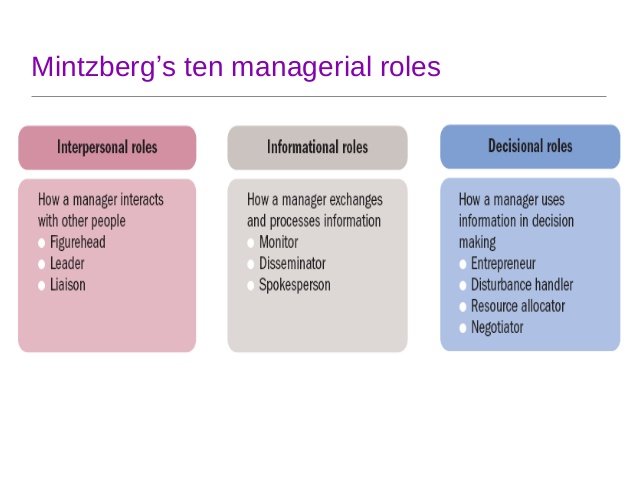Managerial Roles and Organizational Goals
Managers put their efforts to transform and direct the individual’s goals towards the organizational goals with a proper planning. They coordinate the efforts of all employees in fulfilling the objectives of the organizations. Managers bridge the gap between plans and goals by perceiving in advance. What to do? How go do? Who is the right person to accomplish the task? When to do? How much time it take to fulfill the task? etc, they perform the functions of management such as deciding in advance, organizing, staffing, directing, coordinating and controlling.

Management is a social process which involves performing the functions in an effective way to fulfill the purpose of the enterprise. Managers lead the entire people of the organization towards common objectives and being leaders manager face complex and challenging tasks depending on the internal and external environmental conditions and on the nature of the role they perform.

Henry Mintzberg described managerial roles which are most commonly seen in the firms. In order to perform managerial roles, a manager should know his/her responsibilities as per job description and organizations principles, policies, and objectives. During performing duties they might take decisions related to various issues such as planning, organizing, recruiting, training, development, problem-solving, and developing strategies, etc depending on his job’s nature. Mintzberg discovered ten managerial roles in three categories i.e. interpersonal roles, informational roles, and decisional roles.
Interpersonal roles
Mintzberg explained interpersonal roles as human interactions or interaction of a manager with the employees in order to reach the objectives of the organization. Figurehead, leader, and liaison are the three roles under the concept interpersonal roles. Interpersonal roles involve interacting, developing and maintaining good relations with the internal and external environment and creating a positive environment.
Figurehead
This is one of the important roles of managers here manager’s confidence, authority, and various responsibilities make employees expect security and reassurance in order to perform their tasks efficiently. Employees always expect support and help from the figureheads because they believe that the managers can guide and inspire them in a right way.
Leader
This is another interpersonal role of guiding the employees in a way what to do? How to do? When to do? etc. In order to maximize the productivity managers interact with employees communicating, supporting, mentoring, evaluating and motivating employees by offering rewards.
Liaison
This is the third or final role of the interpersonal category which involves communication with the internal and external environments such as employees of the organization and customers. Here communication helps in taking feedback to the future purpose. This activity of managers is somewhat a critical skill which ultimately determines the efficiently of the managers.
Informational roles
The second category informational roles involve gathering information and successfully sharing that information to achieve the objectives of the organizations. Monitor, disseminator, and spokesperson are the three roles under the informational roles category. The informational role includes processing of information through monitoring, communicating and transmitting.
Monitor
In monitor role, managers gather information related to the changes within the organization and changes external to the organization in order to make changes as necessary. So, as a monitor manager involves in tracking necessary information related to the organization, team members and industry to take corrective actions.
Disseminator
Disseminator role involves transmitting the gathered information to the various levels, whether the information is gathered from the internal or external sources finally it is used to take necessary corrective actions within the organization by forwarding the information to the appropriate individuals.
Spokesperson
Spokesperson role involves transmitting the information to the external environment. Here the information may be regarding goals of the organization or promotional activity. As a spokesperson, managers introduce the organization and team to the external word.
Decisional roles
The third category involves decisional roles, in which managers act as decision makers and takes necessary decisions according to the various situation. Various decisional roles are the entrepreneur, disturbance handler, resource allocator, and negotiator. According to this role, the managers take responsibility and use authority to take timely decisions and actions.
Entrepreneur
In the entrepreneur role, managers think like an entrepreneur in decision-making and problem-solving. They generate, develop and implement new ideas in the workplace in order to fulfill the common goals or objectives of the organization. They use skills, knowledge, and courage to bring necessary changes in the organization.
Disturbance handler
The name of the role itself indicates handling disturbance occurs in the organization with their knowledge and skills, here managers handles the situation arises due to conflict or problems related to productivity etc. the ability to handle such situations comes from the entrepreneurial characters of the managers.
Resource allocator
The third role of the category decisional role involves resource allocator. As a resource allocator managers have to gather the resources which are necessary for the operations of the organization. Here the resources may be man, money, materials or machine etc, which are important for the successful running of the organization.
Negotiator
It is the final role of the decision role category, here managers represent the organizations during negotiations. He/she may involve in negotiations or may direct the concern team members of the organization for the active participation. In order to fulfill the goals of the organization, they negotiate with various individuals and teams of the organization to make them contribute their efforts towards the common objectives.
Various situations force the managers to take decisions and solving problems effectively with the help of acquired knowledge and with their innate skills. The skills of managers are characterized as follows.
- Ambition
- Decision making
- Creativity
- Innovation
- Optimism
- Positive attitude
- Possess skills and knowledge
- Independence
- Enthusiasm
- Commitment
- Leadership qualities
- Future-oriented
- Self motivated
- Self-confidence
- Hard working
- Flexibility
- Ready to undertake Risk
- Managing stress
- Managing time
- Problem solving
- Listening and communicating
- Interpersonal skills
- Negotiation skills
- Ability to monitor




